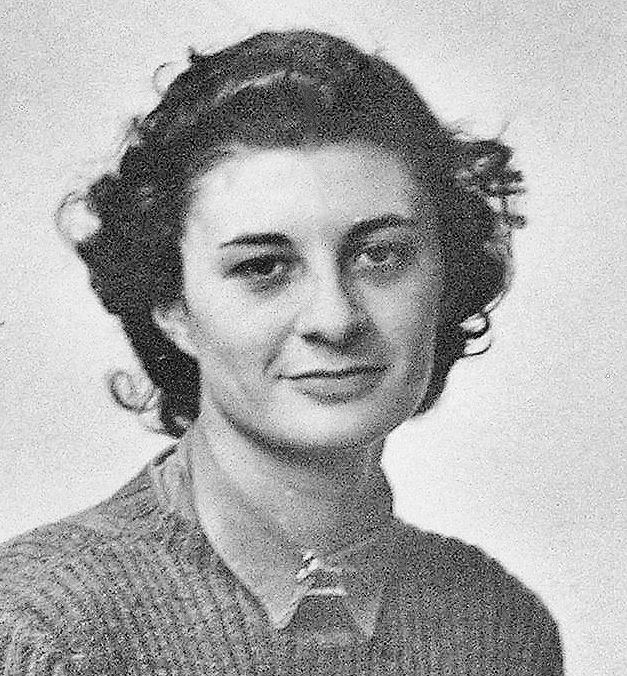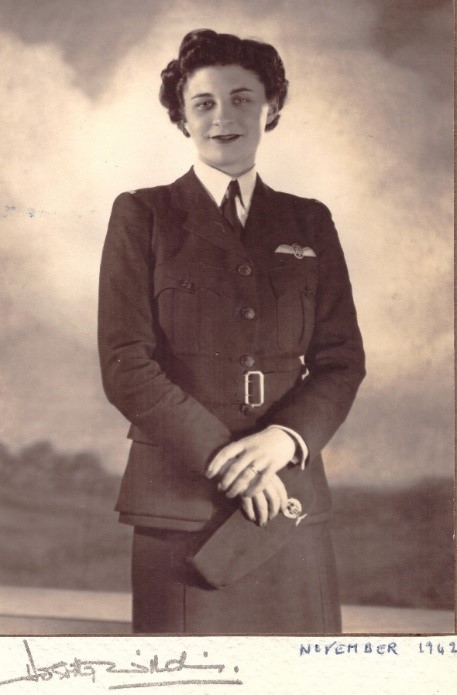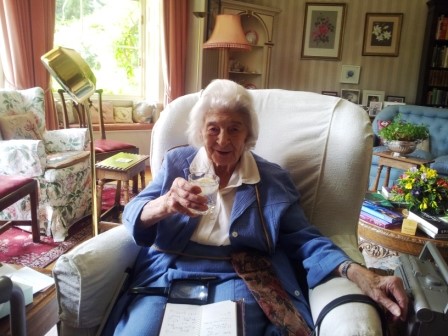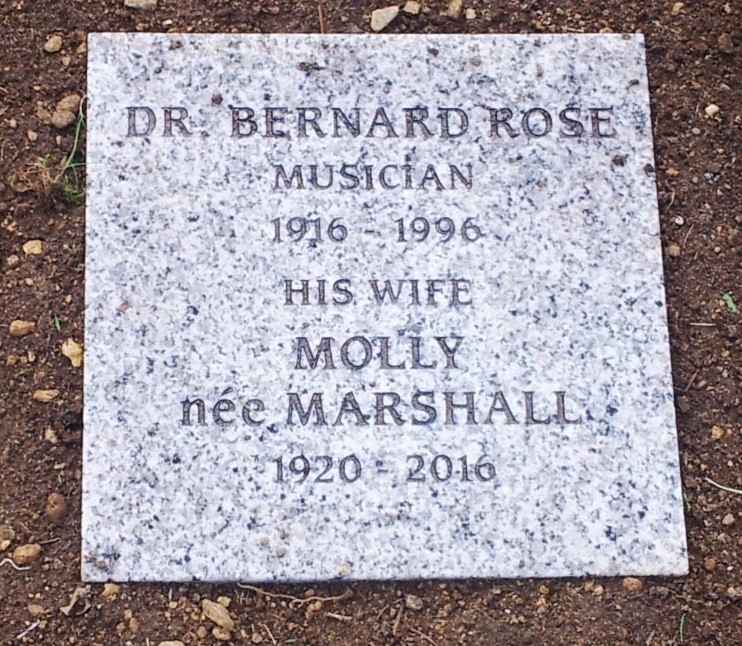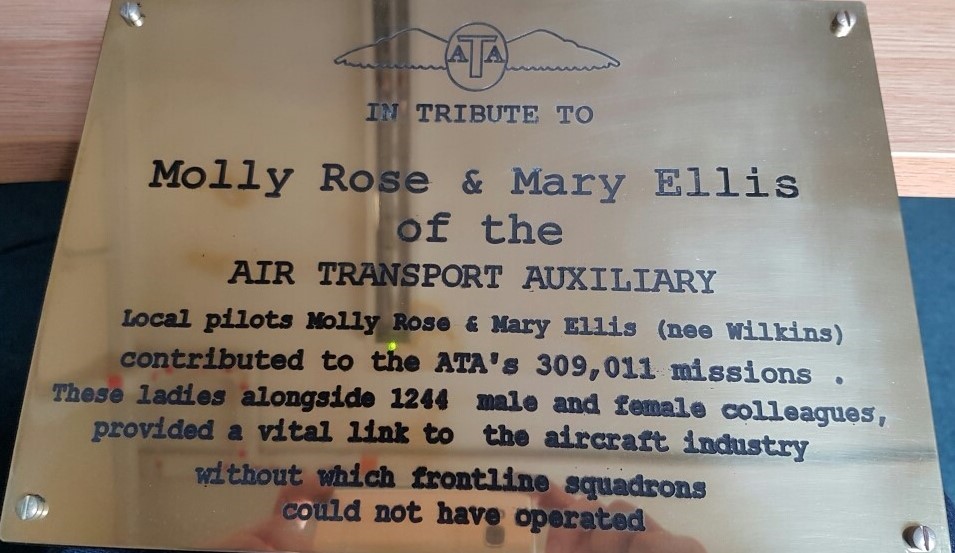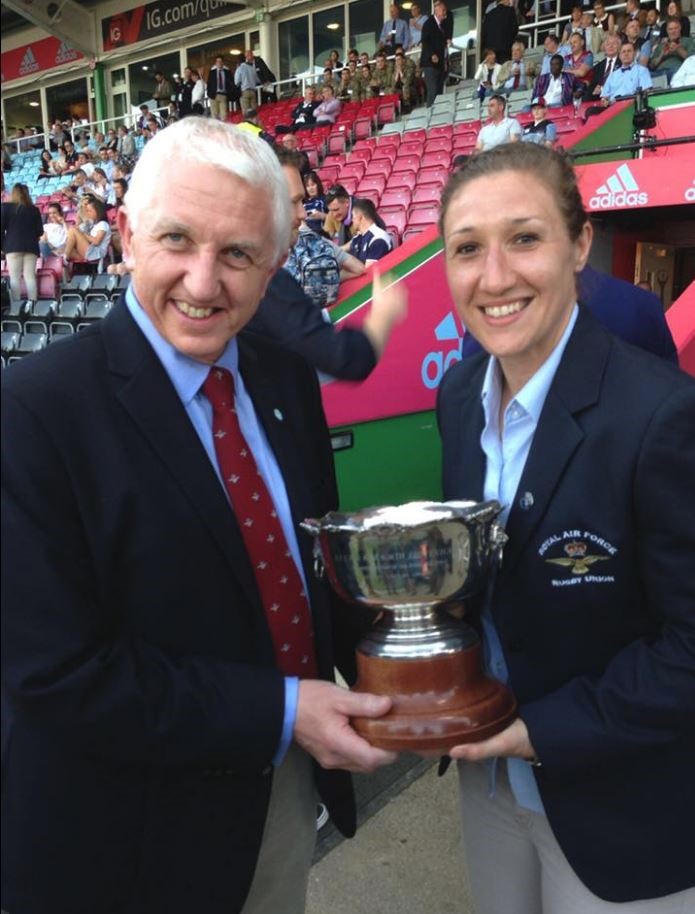née Marshall d. 16 Oct 2016 - Bampton, Oxfordshire Her son, Graham, has kindly sent me "Molly's Story": Molly Rose was born on 26 November 1920 in Cambridge, England. Her parents were David Gregory and Maude Marshall. Her father formed Marshall Motors in 1909 and later Marshall Aerospace and Defence Group. She had two older brothers, Arthur Marshall and Ronald. Ronald died of meningitis in June 1907. With four older sisters and one younger she was brought up in quite a lively household. Margery (b 1908), Dorothy (b 1910), Violet (b 1913), Mary (b 1916) and Brenda (b 1927). Her mother, Maude, died in 1930 when Molly was 10 years old and she and Brenda were, to all intents and purposes, brought up by their older sister Vi. After schooling at Slepe Hall, St Ives, Molly was sent to Paris to a finishing school - that of Mademoiselle Le Dieux at 8 Avenue de Villaire - from January to June 1938. Having enjoyed flying as a passenger in her brother Arthur's de Havilland Gipsy Moth, it was unsurprising that on 1st June 1938 she passed her pilot's licence (Number 14624). Her father, David Marshall, developed the Marshall Motors business he set up in 1909 and her brother, Arthur, formed and ran the Cambridge Flying School. On returning from Paris Molly's father suggested she became an apprentice engineer in the hangars of the family business. She agreed and, over years, became an accomplished engineer. In 1938 she met a Cambridge undergraduate called Bernard Rose who was studying music at St Catharine’s College. He completed his degree and in September 1939 started his career as a tutor in music at The Queen’s College, Oxford. Molly and Bernard were married in Hove Parish Church on 23rd December 1939 (David Marshall had retired to his house in Hove by that time and gave Molly away). Upon declaration of war, Bernard volunteered for active service and by 1940 he had joined the Northamptonshire Yeomanry, a tank regiment. In 1942 he volunteered as a reserve officer for the military operations in North Africa. Her father David Marshall died on 9th July 1942, falling off his horse whilst riding on the Downs in Sussex. Molly was contacted by ATA in August 1942: as she was to remark – “I had just lost my father, and my husband was on a ship to the Middle East. The two men in my life had gone and so I joined the Air Transport Auxiliary on 16 September 1942. As I could not seek permission from Bernard to join ATA I thought that if I sent a jolly good photograph of me in ATA livery, then he would be sure to approve!” Bernard received the photo on his arrival in Cairo and was thrilled with the photo – but worried about the risks. Prior to joining ATA, Molly had a total of just 18 hours 50 minutes of solo flying.
After her initial training, she started flying Magisters in September 1942 at Barton-in-the-Clay, instructed by Joan Hughes Flight Captain William Hampton and others. Her first ATA service flight was in a Magister on 6th November 1942 from Yatesbury to Odiham and by the end of November 1942 she had also trained on the Fairchild Argus, ATA’s favoured taxi aircraft. On 16th January 1943 she flew her first Hurricane and her first Spitfire on 2nd September 1943. On 24th October 1944, after further conversion training to qualify for flying Class 4 aircraft types, Molly delivered her first Wellington bomber from Squires Gate (Blackpool) to Moreton Valence (Gloucester). Molly Rose spent most of her time with ATA based at the all-women Hamble Ferry Pool (FP 15) under Commander Margaret Gore. To start with Molly had rather boring lodgings near the Hamble Ferry Pool. However: she approached her good friend, Diana Barnato, and suggested that, as Diana tended to spend most nights in London, Molly should take over her room in The Bugle Pub. Diana agreed! Molly’s only accident was flying a Swordfish III (NF 262) on 13th May 1944 on a journey across the Wrekin. The Accident Report stated: “The aircraft forced landed in a field, after complete engine failure and was severely damaged” and concluded: “The pilot is held not responsible for this accident.” Molly, in her Imperial War Museum interview, said: “I was taking a Swordfish down from Shifnal to the south and the engine cut out going over the Wrekin and I had to force land. The fields round there seemed extraordinarily small and, having chosen a field and doing as rough an approach as one obviously would if you hadn’t got any engine but heading into wind and aiming at this one, I didn’t know that the field was slightly downhill and on the other side of the hedge there was a young lad ploughing. To avoid him I had to swerve hard left, whereupon the aircraft turned over and a very angry woman got out of the aircraft, and because it had got secret equipment on it I had to get the boy to mount guard on it while I went and telephoned. The RAF had to come from Cosford and mount guard overnight – this was a Saturday and I was extraordinarily unpopular in the mess because they had a dance on and two chaps had to miss the dance!” On Monday 5th June 1944 Molly and her colleagues noticed a vast gathering of small ships in the mouth of the River Hamble. She records: “The night it all started there seemed to be added tension to the activities on the river and I remember taking a radio to bed to hear the next morning on the six o’clock news that the invasion had started and knowing that Bernard would be in it.” So, D-Day had commenced. Molly said: “Seven days later he was posted “Missing, believed killed”. My first information of this was from a colleague of his, a fellow officer, who wrote to me, and his letter was the first thing I got saying he had seen Bernard’s tank burning and there was no way anyone could have got out of that tank – that he had seen it shot up and burst into flames. What he didn’t know was that Bernard was getting someone else out of another burning tank at that precise moment so wasn’t in his own tank that was blown up. I did not know this for six weeks and during that time I had a communication from the War Office saying Captain Bernard Rose was missing and then: he was “missing, believed killed”. My Commanding Officer and the ferry pool down at Hamble were extremely good to me. They had all known Bernard and so were very sympathetic to me, and after three days I reported back for duty and it was accepted that I was capable of going on working and this was a great blessing. “At the end of six weeks I got a card from Bernard’s POW camp.” Bernard was in Oflag 79, a POW in Brunswick and had been marched and transported by filthy trains and trucks across France and Germany to Bavaria. In September 1944 Molly was promoted from Second to First Officer. Bernard was released from his prisoner of war camp on 24th April 1945 and on 23rd April Molly had her last solo flight delivering a Spitfire XIV from Lyneham to Lasham. Her last flight with ATA was on 24th April as co-pilot, with Maggie Frost as the pilot, in a Fairchild from Wroughton to Hamble. Her record with ATA was delivering 486 aircraft during World War II, with 38 different types of aircraft, 705 hours and 45 minutes flight time and including 276 Spitfires. She never piloted a plane again: “if you have flown a Spitfire, there is nothing to compare”! Meanwhile, Marshall, the family business at Cambridge had devised a revolutionary procedure for the rapid training of pilots and their flying instructors; during the Second World War the Marshall Flying Schools trained more than 20,000 pilots and instructors for the RAF, and its methods continue to be used by the RAF to this day. After the war, she raised three sons with her husband Bernard and became a Justice of the Peace in Oxford. She was active raising funds for various charities in Oxfordshire, was appointed a Deputy Lieutenant for Oxfordshire in 1983 and was awarded the OBE for Services to Oxfordshire in 1990. Molly also served as a Parish Councillor in the village of Appleton in Oxfordshire. Bernard moved from The Queen’s College, Oxford to Magdalen College in 1957 as Informator Choristarum (organist and master of the choristers) and a Fellow in Music. He became a distinguished musician and is credited with laying the foundations for the reputation the Magdalen Choir has to this day. After the publication of the book ‘Spitfire Women’ written by Giles Whittell, Molly and the remaining ATA ladies became in demand for media activities. These included an appearance as a judge in the TV programme “The Great British Menu” in 2014, having the Teversham Primary School named “The Rose Outdoor Learning Centre” and interviews on BBC Radio Oxford.
Molly and Bernard lived in Bampton (Oxfordshire) from 1946 until 1974 when they moved to live in Appleton Manor. In 1986 they moved back to Bampton to live in Bampton House. Bernard died of emphysema in November 1996. She died of a heart attack on 16 October 2016 at the age of 95. Bernard and Molly are buried in the churchyard of St Mary the Virgin, Bampton Oxfordshire.
As the BBC had recorded an interview with Molly just before she died, the interview was used as part of the 2016 Remembrance held in the Royal Albert Hall, with David Dimbleby commenting: “Sadly the estimable Molly Rose recently passed away”. She had been due to join her ATA friends, Mary Ellis and Joy Lofthouse, in parading in the middle of the Royal Albert Hall in front of the Queen and the Royal family. After Molly’s death in 2016 the Station Commander of RAF Brize Norton, Group Captain Tim Jones, suggested there should be a memorial tree and plaque at RAF Brize Norton. The family asked that Molly’s good friend, Mary Ellis (nee Wilkins), also be mentioned on the plaque. Mary’s family farmed at Brize Norton Manor Farm in her childhood – very local connections! The dedication took place in February 2017 and Mary was present.
In 2018 the Rose family was asked if they would agree a trophy, to be awarded to the winner of the women’s inter-services rugby final, could be named “The Molly Rose Trophy”. The family readily agreed and below is a photograph of the Chairman of the RAF Rugby Union, Air Commodore Steve Lushington, with the 2018 winning captain, Flight Lieutenant Chrissy Siczowa.
Many thanks, Graham.
Download ATA Pilot Personal Record (.zip file): IWM interview here: https://www.iwm.org.uk/collections/item/object/80009749 |
- Details
- Hits: 2209

